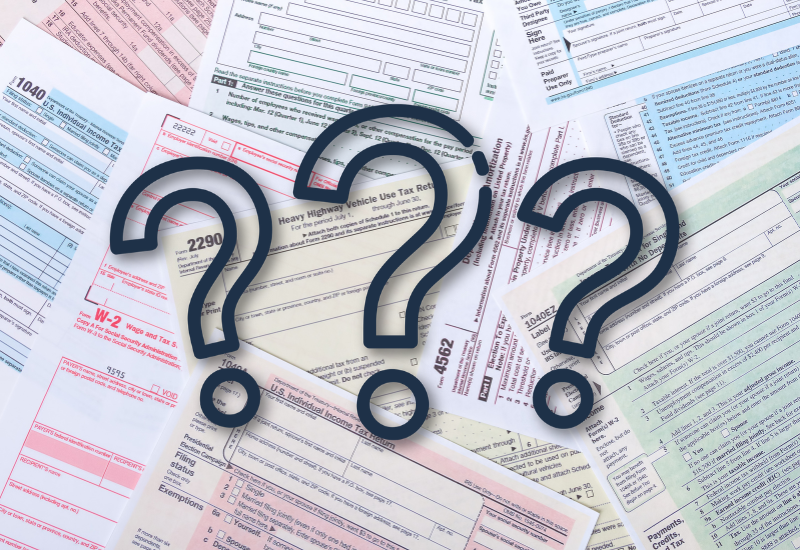13 Common Tax Forms and What They are For
- May 27, 2022
- Posted by: CKH Group
- Category: Tax tips

Our List of the Most Common Tax Forms
All of the IRS’s tax forms can be confusing, especially to those not familiar with tax and accounting. This small guide will help you understand some of the most used tax forms and what they are for.
1. Form 1040- U.S. Individual Income Tax Return
Form 1040 is where you declare your filing status, take your standard deductions, claim any tax credits, and determine how much you owe the IRS. This is your starting point to understanding the basics of your tax return.
2. Form 1040-SR- U.S. Tax Return for Seniors
This is a special tax form available for seniors to use as an alternative to Form 1040. Taxpayers who are 65 and over will experience enhanced readability and fewer complications with Form 1040-SR. Seniors are able to easily document common sources of income such as Social Security, IRA distributions, annuities, and any investment income.
3. Form W-2 Wage and Tax Statement
Hang on tight to your W-2! You will need this form to determine how much you paid in taxes for the year. It will reflect how much income you’ve made for the year. Every employer who has withheld income tax, Medicare tax, and Social Security throughout the year should issue you a W-2 by Jan. 31.
4. Form W-4- Employee’s Withholding Certificate
This form is used to determine how much federal income tax an employer should withhold from your paycheck. When you start a new job, you will most likely receive a Form W-4 to complete.
5. Form W-4P- Withholding Certificate for Pension or Annuity Payments
If you received a pension or annuity, you’ll need to use this form to help you navigate the various rules for these kinds of payments. It is for resident aliens, U.S. citizens, or their estates. This form is used to determine the amount of federal income tax that needs to be withheld from those payments.
6. Form 1099-MISC- Miscellaneous Income
If you were paid $600 or more from a single person or entity during the year, you’ll need this form. A copy of this form will be provided to you and the IRS. This form is used to report rents, royalties, and other types of income.
7. Form 1099-G- Certain Government Payments
The most common type of income found on a 1099-G is unemployment benefits. This compensation is taxable and must be included on your tax return to calculate your total taxable income for the year. This form also contains other government payments such as state and local tax withheld from any government payments received, taxable grants, and any payments received from the Department of Agriculture.
8. Form 1099-K- Payment Card and Third-Party Network Transactions
Individuals who are involved in transactions with a payment settlement entity (PSE) will receive this form. For example, Uber and Lyft are considered a thirdparty network that facilitates transactions on behalf of the driver. Rideshare drivers who earned greater than $20,000 and performed at least 200 rides may receive a 1099-K for their work. However, it all depends on the state you live in, so talking with a tax expert may be helpful.
9. Form 1099-INT- Interest Income
Be on the lookout for Form 1099-INT from your bank, brokerage, or other financial institutions if you earned more than $10 in interest for the year. This form will report different types of interest, such as interest on U.S. Savings Bonds and Treasury obligations, interest income from banks and brokerages, and tax-exempt interest.
10. Form 1099-DIV- Dividends and Distributions
Dividends are an extra channel of income for investors, and they must be reported to the IRS. This form will disclose your qualified versus ordinary dividends. You’ll also find information about capital gain distributions and Section 199A dividends.
11. Form 1098-T- Tuition Statement
You will receive a tax form for paying college and education tuition expenses. These expenses may qualify you for deductions or tax credits.
12. Form 1098- Mortgage Interest Statement
If you paid $600 or more in mortgage interest, you should receive this form as a reminder of how much you paid. But it is your responsibility to keep track of your mortgage interest if it is less than $600 because your lender won’t be required to send you a form.
13. Form 1095-A- Health Insurance Marketplace Statement
If you received health insurance from the marketplace, you’ll receive Form 1095- A in the mail or online via a HealthCare.gov account. This form is needed before you file your tax returns. The form includes premium tax credits used and premiums paid.
BONUS
Form 4868- Application for Automatic Extension of Time to File U.S. Individual Tax Return: If you need an extension to file your individual income tax return, you must file Form 4868. You can also read our article about applying for a federal tax extension. If you have any questions, CKH Group is here for you! Reach out and let’s chat, or you can contact us at at 1-770-495-9077 or email us at info@ckhgroup.com
The above article only intends to provide general financial information and is based on open-source facts, it is not designed to provide specific advice or recommendations for any individual. It does not give personalized tax, financial, or other business and professional advice. Before taking any form of action, you should consult a financial professional who understands your particular situation. CKH Group will not be held liable for any harm/errors/claims arising from the articles. Whilst every effort has been taken to ensure the accuracy of the contents, we will not be held accountable for any changes that are beyond our control.
